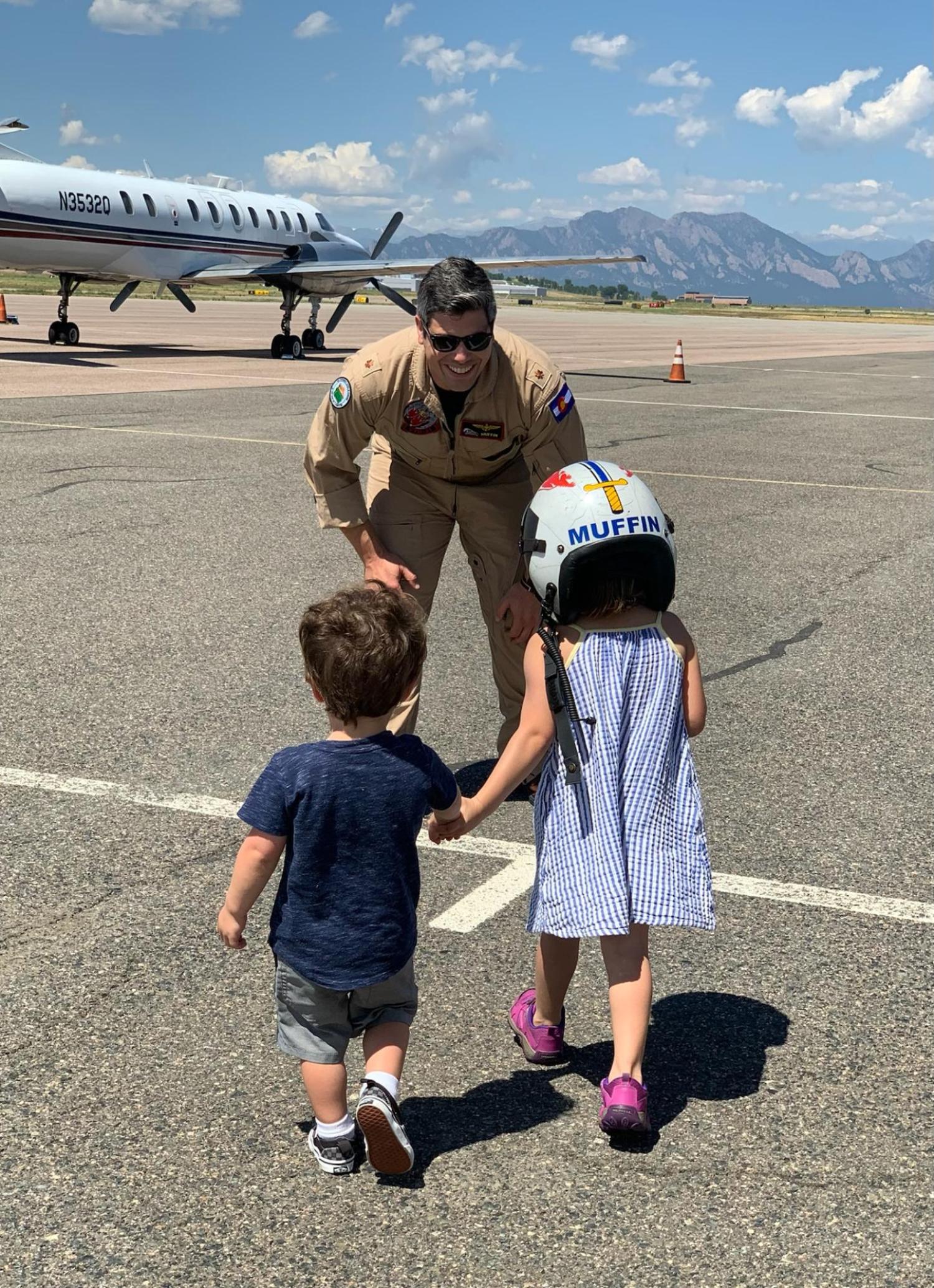Alumni profile: Pilot returns to his engineering roots

- Name: Tom Powers (MElEngr'22)
- Professional master's sub-plan:Next Generation Power and Energy Systems
Tell us a little about your professional and educational background.
I graduated from the United States Merchant Marine Academy in 2007 with a degree in marine engineering systems and a minor in electrical engineering. It was a really engaging program, with opportunities to learn hands-on maintenance and design of marine propulsion plants and auxiliary systems. However, I decided to take a different track after graduation and commissioned in the United States Navy to pursue flight training and eventual designation as a Naval Aviator. I completed flight training in July 2010 in Corpus Christi, Texas, and moved to Norfolk, Virginia, to fly the E-2C Hawkeye for four years. I was also lucky enough to meet my spouse, Amanda, while stationed in Norfolk. I deployed twice aboard the USS Eisenhower, and upon the completion of my sea tour I returned to the Texas Coastal Bend as an instructor pilot in the T-45C Goshawk. After four and a half years in Texas I decided to end my active duty service, transition to the reserves, and become an airline pilot. I was hired by United Airlines in 2018 as a 757/767 First Officer and I am currently a flight instructor at the United Airlines Flight Training Center in Denver. I also continue to instruct in the T-45 as a Naval Reservist and spend about two months a year down in Kingsville, Texas.
What made you decide to pursue a professional master’s in power and energy systems at CU Boulder?
Applying to the NGPES program was, to be honest, a response to the 2020 pandemic. Air travel fell off a cliff and as a junior pilot with United, I was faced with a furlough and a difficult decision to either return to active duty in the Navy or take the riskier option and try to expand my professional horizons. I noticed the nascent NGPES program as I was researching master's degree options, and it seemed like a fantastic option to return to my engineering roots while making inroads to the rapidly growing field of renewable energy. I have my advisor, Dr. Bri-Mathias Hodge, to thank for moving mountains to get me in the door in time to start the fall 2020 semester. Returning to the engineering classroom after 13 years of flying was a bit of a shock, but I had some great classmates and teachers to help me knock the rust off.
What is the most interesting thing you learned or explored during your time in the program?
With my background in marine engineering and aviation, I was really interested in offshore wind generation. I was lucky enough to work on and publish a paper with Drs. Sajadi and Hodge about offshore wind expansion here in the United States. It was an eye-opening experience to the work required to prepare a paper for publication but was an excellent professional development experience. My favorite course in the program was Dr. Krad's ECEN 5417 Power System Analysis. It was a great foundational class for the NGPES syllabus, and I really appreciated and respected Dr. Krad's student focused teaching style.
What do you hope to do after you finish your degree?
I just graduated in fall 2022, so I am asking myself, "Where do we go from here?" For now, I'll continue to instruct and fly for United. I am drawing my time as a Navy instructor to a close and hope to leverage this degree to transition away from a flying reserve billet to something in support of renewable integration on the military side. Energy independence is a national security issue, and a transition to renewables supports those goals. I'll keep you updated: For now I'm taking a bit of breather from juggling a marriage, two jobs, and two kids in addition to a full-time master's program.
What advice would you give to someone who is considering pursuing a professional master’s in power and energy systems?
My advice for future students interested in the NGPES is to keep in mind that a master's degree isn't just about developing an understanding of the subject matter. It is also about building a network of folks that you can call upon with professionally. No one person will be an expert at everything, getting to know the strengths of your classmates will pay dividends when you are working as a team, both at CU and as a professional. While an engineering master's program is very materially focused, networking is just as important for success in your follow-on career.
When you’re not working, what do you like to do?
When I'm not working, Amanda and I spend the bulk of our time raising our two children, Ivy (4) and Evan (2), as well as giving our Labrador retriever, Porter, as much attention as we can spare. We want to get back to our outdoor hobbies like hiking and running but it can be challenging couching our wants against the kids' needs. I travel a fair amount for work but I look forward to leisure travel with Amanda in the near future.

